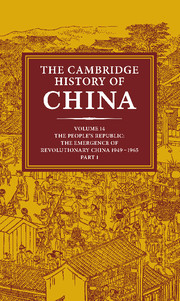Book contents
- Frontmatter
- 1 The reunification of China
- PART 1 EMULATING THE SOVIET MODEL, 1949–1957
- PART II THE SEARCH FOR A CHINESE ROAD, 1958–1965
- Bibliographical Essays
- Bibliographical essays for chapters
- Bibliography
- Appendixes: Meetings and Leaders
- Conversion Tables: pinyin and Wade-Giles
- Glossary Index
- Map 1. China’s physical features
- Map 2. PRC: political (Wade–Giles romanization)
- Map 3. PRC: political (pinyin romanization)
Bibliographical Essays
Published online by Cambridge University Press: 28 March 2008
- Frontmatter
- 1 The reunification of China
- PART 1 EMULATING THE SOVIET MODEL, 1949–1957
- PART II THE SEARCH FOR A CHINESE ROAD, 1958–1965
- Bibliographical Essays
- Bibliographical essays for chapters
- Bibliography
- Appendixes: Meetings and Leaders
- Conversion Tables: pinyin and Wade-Giles
- Glossary Index
- Map 1. China’s physical features
- Map 2. PRC: political (Wade–Giles romanization)
- Map 3. PRC: political (pinyin romanization)
Summary
This essay precedes several bibliographical essays on specific aspects of the People's Republic of China. It traces the evolution of scholarly writings on China by identifying the major sources on contemporary China, portraying their main limitations, and assessing the effect of the changing mix of sources available to the foreign researcher.
Researchers into the politics, economy, society, and culture of the post-1949 era confront many serious constraints. The student of contemporary China learns to use a diversity of sources: the mainland press in Chinese and in translation, accounts by emigres and Western residents, interviews with emigres and Chinese citizens abroad, fiction, analyses by foreign governments (sometimes partly based on clandestinely obtained information), and information derived from personal observation and field research in China. Because of the limitations inherent in each of these sources, the essence of research on China is to search for convergence among diverse sources. Where the various sources point in a similar direction, the researcher can be somewhat confident of the validity of the conclusions, but when the sources point in disparate directions, analysts must qualify their judgments and seek to reconcile the apparent discrepancies.
Keywords
- Type
- Chapter
- Information
- The Cambridge History of China , pp. 543 - 590Publisher: Cambridge University PressPrint publication year: 1987

